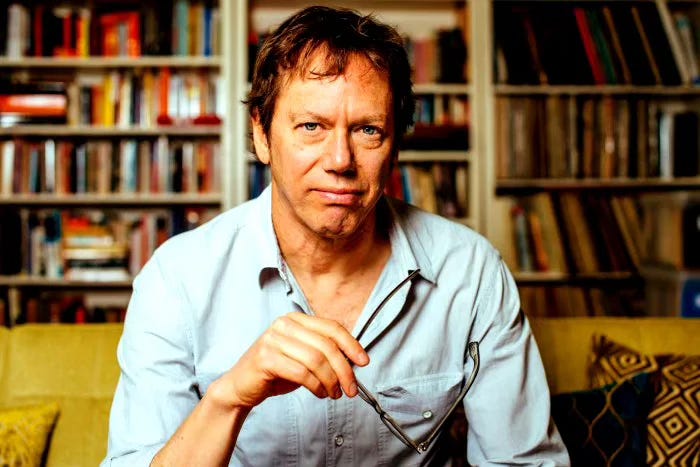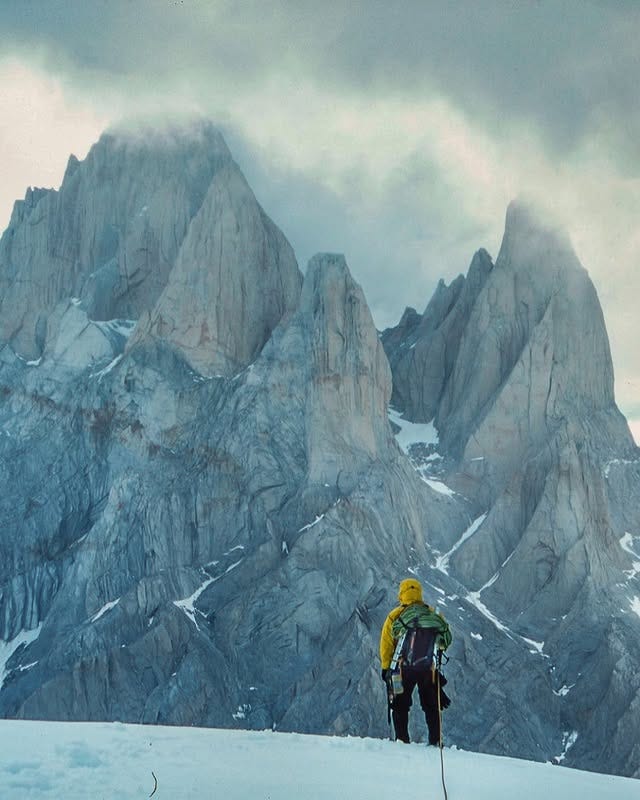The Humble Stumble
Discipline = Freedom (x3)

In this newsletter, you’ll hear me talk about how I believe there is a way of things. That there ought to be a way of things. It seems like we’re governed by some kind of natural law - there are things that are good for us (we expand) and things that aren’t good for us (we contract). It’s because we’re a part of a natural system that is evolving every second - even though we’re hell-bent on denying that fact.
“The world is bursting with wonder, and yet it’s the rare productivity guru who seems to have considered the possibility that the ultimate point of all our frenetic doing might be to experience more of that wonder.” - Burkeman
Isolated blue light hurts us because we chronically avoid the ultimate source of light - the sun. EMFs hurt us because we evolved for hundreds of thousands of years prior to Tesla’s electrification of the planet at The Chicago World Fair in 1893. Being alone hurts us because we developed in groups - we can only come to know ourselves through other people. Modern hustle culture gets us into trouble in our 20s because meaningful work and ability are the product of a long time and apprenticeship under mentors.
When we look back in time - to the not so distant past - at groups of action-oriented philosophers like the Stoics, it’s clear that we find ourselves in a cultural context with the least structure of any time before it (though not true of all cultural contexts, and in those cultures they’ve seemingly found a way to maintain high trust). This lack of structure gives us great individual freedom - no doubt a blessing in some respects - but it also seems to break down the whole. We obsess over our own well-being at the expense of the group.
“We are only a tiny part…On our own we can do nothing.” - Stutz
Naval - a modern philosopher - even though he wouldn’t’ call himself one - talks about the life path ‘… of the ancients.’ In this system of life you study first, learning all of the basic things one needs to know to function in society - to be a contributing member. From there you’d serve your people in combat, joining the military. After your military service you’d go to the marketplace as a merchant or business person. Then, in your wiser years you’d serve again in the senate or local politics and, finally, if you’ve accumulated enough wisdom you’d teach in the Academy. Life is lived in phases and your education lasts a life-time.
We can see echoes of this in cultures that maintain traditions like mandatory military service when you reach adulthood. Many have suggested a variation on that tradition - like a compulsory year in service, even if that means the Peace Corps or something like it. To be of service is a great joy for human beings. In fact, it’s essential to our well-being.
The point is there was a structure - a rhythm to time - and within that structure you could find your place, use your gifts, and make meaning. As my grandfather once told me - ‘…you need to be in the business of using your gifts.’
In a similar vein, I’ve developed a framework of my own that might be useful to us here, in the 21st-century. It’s a process, as all good things are, and it takes root over the course of Four Acts.
“The most important thing about art is to work. Nothing else matters except sitting down every day and trying.” - Pressfield
All we need is a point of view, a set of tools, and a lot of time.
I hope that in this post you learn that discipline is a process, that there are multiple kinds of discipline, and that each are essential to moving through your current stage of life.
Here are some of The Tools used in this post:
Lessons for Living by Phil Stutz
The Daily Laws by Robert Greene
The War of Art by Steven Pressfield
Four Thousand Weeks from Oliver Burkeman
The Lion Tracker’s Guide to Life from Boyd Varty
Learn Life, Yes Life, No Life, Teach Life
Act 1 is called Learn Life.
In this act you have little choice but to put your head down and persevere - the obstacle is the way. You have to learn how the world really works - how to interact, cooperate, speak, read, write and think. You learn how to interact with the group - to be part of a team. Ideally, it’s also where you learn the importance of discipline, but you likely won’t. You’re too raw, too ambitious, too selfish, and too naive. That’s okay - for a time - but it won’t last forever. The bliss of ignorant youth.
In this phase you’re also learning about yourself. We’re all born with unique gifts and inclinations - we’re 1 of 1s. Biological non-fungible tokens. Your goal in Act 1 is to understand these inclinations deeply, and to convert them into the development skills and abilities that you will take into Act 2.
In truth, Act 1 lasts a life-time, but in earnest it takes 22-25 years until you can move forward in a productive, meaningful way.
Robert Greene might equate this to the ‘Deep Observation’ phase of Mastery.
“It is the difference between grasping at an illusion and immersing yourself in reality. And reality is what will liberate and transform you.” - Greene
Act 2 is called Yes Life.
If you’re going to take what you’ve learned in Act 1 and translate it into meaningful opportunity, you need to be in the business of saying yes. Can you take this on? Yes. We’d like to offer you this job. Yes. Would you like to go on a date? Yes. This course is available in the Spring and would really help your personal and professional growth. Yes.
What you’re trying to do here is use your abilities and inclinations from Act 1 to start bringing real value. You’re a sponge being squeezed - you turn your learnings int action and you open yourself up to opportunity. You can survive this sweet spot because your energy and enthusiasm is still peaking.
Unlike the first, Act 2 doesn’t last very long. The reason is simple and trite - life is short and you only have so much time to do your work. In the beginning, saying yes is expansive (one of the archetypes of discipline you’ll learn shortly), but on a long enough time horizon, it stops being expansive because you’re pulled too thin. You can’t focus and you start fulfilling other peoples to-do lists, not your own. You get wrenched and ripped from your gifts by the world, and it’s hard to avoid, but it must be done.
“But now here we get to the heart of things, to a feeling that goes deeper, and that’s harder to put into words: the sense that despite all this activity, even the relatively privileged among us rarely get around to doing the right things. We sense that there are important and fulfilling ways we could be spending our time, even if we can’t say exactly what they are - yet we systematically spend our days doing other things instead.” - Burkeman
You do this by leveraging your gifts and inclinations in Act 1, with the goal of getting really good at something the world needs. In some ways, you have to be passionate about this thing, because you won’t stick with it otherwise. Don’t worry if this isn’t immediately true - use this time to build as many skills as you can, and solve problems that other people need solved. Act 2 may last only 5-10 years.
Robert Greene might equate Act 2 to the ‘Skill Acquisition’ phase of Mastery.
“Work every day on improving those skills that mesh with your unique spirit and purpose. Add to the needed diversity of culture by creating something that reflects your uniqueness. Embrace what makes you different.” - Greene
Act 3 is called No Life.
If the world is experienced through forces, there is a counter-force to Act 2 that gets you to the next stage of your evolution, and the evolution of your family and community. It’s the exact opposite of Act 2 but infinitely harder. You know you’re moving into Act 3 because you’re starting to bring real value and you’re being berated with opportunity. Bludgeoned over the head with it! This is a great blessing - an indicator that you’re doing your work and solving peoples’ problems. But the obvious conclusion - this can happen within weeks or months, often in the form of epiphany - is that there are obviously too many opportunities to say yes to!
To move forward - to become Shokunin, or Master, or Nonna Anna, or whatever it is you’re looking to do - suddenly you have to say no to almost everything. You have to disappoint people and protect your time like it’s gold. The beautiful thing - it seems - is that this actually doesn’t have the risks and scary-things you might think would be associated with saying no. That’s pop-culture talking. That’s FOMO. The reality is Act 3 is incredibly expansive because you’ve found your home and you’re making something meaningful there. Building your cabin on the pond like Thoreau. Don’t fear. You’re in the right place. You’re in your place. You know what you want and what you don’t want. You have priorities and you’re willing to let the opportunity pass you by because your work is sacred.
This phase could last for the next 20 years because this is when you’re doing your deepest, most meaningful work. Act 3 could take you well into middle-age, and amplifies the work you did in Act 2.
Robert Greene might equate Act 3 to the ‘Experimentation’ phase of Mastery, although he might see it slightly differently.
“Do not dream or make grand plans for the future, but instead concentrate on becoming proficient at these simple and immediate skills.” - Greene
Act 4 is called Teach Life.
Act 4 is the final step, and steps are not to be skipped. After a long life, lived in 3 Acts, you can return to teach what you’ve learned. Much like the Ancients, teaching comes at the end. Waiting until the end requires great discipline. We want to stand up and cry “I matter!’ in Act 1, but in many respects, we haven’t earned the right. In Act 1 you’re overflowing with conviction but have no credibility (a particularly good manager once told me this to my face, as a 21-year old who was full of piss-and-vinegar - thank you Brian!). You return to teach at the end because that’s when you’ve earned wisdom through action, collaboration, and repetition.
When you’ve done the work. When you’re calm. When you can see the big picture, make a judgement call, and get it right (once in a while). Good judgement is the by-product of time, and eventually, you want to get paid for your judgement. When you can confidently say I’ve put in the work - I’ve pushed the rock uphill. When you’ve been asked by your peers to share what you’ve learned and give back. Then you can ‘teach life’ to those who will eventually take your place.
In a traditional context - maybe even more so in a modern one - this is an essential role. Not only for the incoming batch of young apprentices, but for the mentor batch as well. It allows the former to confidently begin Act 1, and it allows the latter to fulfill their final role in society - for many, an honour-bound duty. Tying a bow on a life well lived.
“As years go by and we remain faithful to the process, yet another leap takes place - to mastery.” - Greene
Discipline
Now you know how to identify which Act of life you’re currently in. How do you move forward through each Act, overcoming the inevitable hurdles that will be obstructing and obfuscating your path? It’s as simple as simple gets - the answer is discipline, and there are 3 kinds of discipline. The Humble Stumble.
I first encountered the term above by following that man - Jimmy Chin. Jimmy’s work is ascending and descending mountains, weighed down by camera gear. He combined his early inclinations of climbing and skiing with the technical ability of photography and videography. In isolation, neither of those two things is rare - and he isn’t the GOAT in any discipline in particular. It’s the unique combination of those two things that sets Jimmy apart. That’s mastery.
For Jimmy, the humble stumble doesn’t look anything like sitting in a cafe in the historic district of Mexico City, with an espresso and a Topo Chico, like the cover image of this post. It looks more like trudging up mountains in a touring setup, or packing a stuff-sack for a long day on the side of a rock wall. Because the former isn’t his work, and the latter is.
Your job is to sort out what your humble stumble is. To find your work and then unlock the discipline that leads to the incredible things on the other side of your work. It sounds counterintuitive at first touch, but discipline does equal freedom, in almost every way. What first feels like limitation is actually pure, unadulterated expansion. If you and your partner stick to your budget, you have more freedom of decision making in the short and long-term. If you have nutritional discipline - if what goes in to your body matters - you experience the incredible joy of good health. If you’re dedicated to being more open emotionally you have the opportunity to build deep relationships with other people - which leads to more opportunity in other domains. If you have the discipline to take small strides every day toward your goals, you allow your work to compound over time.
Discipline compounds unlike anything else.
In recent posts on the newsletter we talked about higher forces, how they’re real, and why they matter. You might call it flow, or energy, or productivity - it doesn’t matter. Few things allow you to tap into higher forces like discipline.
“Discipline forms an invisible structure in your life, a structure that attracts and holds the higher forces.” - Stutz
There seem to be 3 kinds of discipline, and you can access them right now.
Structural Discipline
Reactive Discipline
Expansive Discipline
Structural discipline is likely the most underrated, but it’s the one we encounter every waking minute. It’s also the one we’re so quick to ignore because structural discipline likely won’t generate any content, and it won’t get you praise or validation. It’s the epitome of the humble stumble.
“It consists of things you do routinely - eat, sleep, exercise, etc. The goal is to live in a constant rhythm…Living each day with an organized structure teaches the ego to submit to something bigger than itself - time.” - Stutz
Again, at first glance, structural discipline feels like it would be boring or restrict you in some way - but when you’re in it, when you can really feel it, it turns out to be the exact opposite. It brings more energy and more expansion than our modern definition of ‘freedom’ ever could.
“To get out of a lethargic state, the first thing to do is put the structure back into your daily living.” - Stutz
Reactive discipline is the category we know best, and the one that most struggle to get a handle on. It’s a combination of No Life, paired with controlling your mind when you’re inevitably bombarded with the stuff modern life comes with.
“If you’re a sugar junkie and someone offers you a cookie, you need reactive discipline to refuse…When you lose control, you’ve fallen under the spell of the outside world and lost connection with higher forces - which are only found inside.” - Stutz
The last is expansive discipline, and it seems to be the one that we associate with most modern times - even though we clearly misunderstand it.
It’s the “…action steps you must force yourself to take to expand your life…It also includes taking steps to develop new ideas and undertake new creative pursuits. In personal life, expansive discipline includes making new friends or developing new activities.” - Stutz
Here-there-be-dragons. We could easily mistake expansive discipline for the material craving of excitement, views, likes, or downloads. This is not expansive discipline. Expansive discipline is the feeling you get when you’re truly in relationship with the outer world. You may not have considered this as a form of discipline at all - that’s totally understandable - but it clearly is because of how few of us in modern times actually do it.
“Because there’s anxiety and uncertainty in doing new things, most of us avoid expansion. It takes discipline to consistently force ourselves into the unknown.” - Stutz
Stutz visualizes discipline as a box, surrounded by the chaos of modern life. The world is still happening around you - it always will - but in the box you feel a sense of self and an energy to do your work. You’re still in constant relationship with the outer world, but you use discipline to interact with it in a way that lets you develop a sense of inner power. This is very rewarding.
“The rewards of living inside this discipline box are tremendous. Life is more meaningful. You can actually develop the strength to obtain your goals.” - Stutz
This does not mean we don’t let spontaneity into the box - but it does mean that time works in rhythm and process, and we are completely bound up in time.
“The Universe is constantly expanding. To stay connected to its higher forces, we need to keep up with it.” - Stutz
It’s ironic that what the devil thought was punishment, is actually what set Sisyphus free. Continuing to push the rock uphill everyday creates a great sense of humanity, of purpose, of meaning, and eventually of joy.
All we need is a point of view, a set of tools, and a lot of time.
Onward.
See you on the path.
-MG





Thanks for the good word on my photography trips, and the sugar and cookie quote is something I always need ponder!